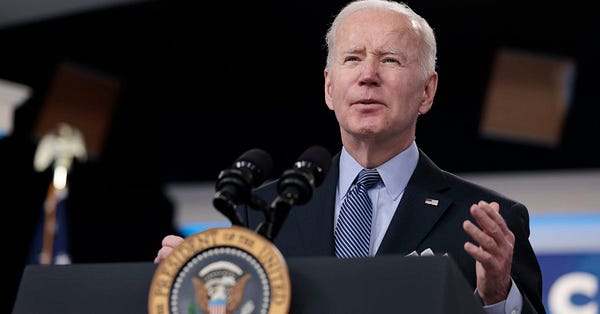It's the Service Economy, Stupid
Why do so many people think America is losing jobs when it isn't? Because they've never experienced full employment.
Why do (many) Americans think a good job market is actually bad? Politico’s Playbook newsletter the other day highlighted a “little-noticed survey” showing that “37 percent of the public thought that more jobs had been lost (yes, lost) over the last year while just 28 percent thought that they had been gained.” Nearly half of Republicans believe more jobs have been lost than added over the last 12 months.
In reality, the U.S. labor market is extremely “tight,” as the business press likes to put it, with hundreds of thousands of jobs added every month since Joe Biden took office. The official unemployment rate, 3.6 percent, is at a two-year low, and the labor force participation rate is nearly at the level it was just before the pandemic.
All of that is, statistically, “good news” for working Americans. Yet despite that, and despite the fact that presidential approval is often said to be tied to economic performance, Joe Biden is unpopular. So the political press searches, in surveys such as the one highlighted by Playbook authors Sam Stein and Max Tani, for the answer to this paradox.
“That these basic facts aren’t translating to the public says a lot about how news is disseminated and consumed,” they say, which is as close as any mainstream news outlet ever gets to acknowledging their own role in the creation of “reality” for American voters. It is indeed the case that the press (in particular, but not exclusively, the conservative press) has been relentlessly negative about the economic situation over the last year, which might cause Americans to believe things are very bad.
The authors also point to inflation, which is real, and felt by regular people at the gas station and the supermarket. Obviously, wage gains are unequally distributed, but rising prices are paid by everyone. “The economy” is genuinely bad for many, especially those who most benefited from expiring Covid relief measures or those now facing rent hikes.
But between the “reality” of inflation and the spin of GOP messaging and corporate media, there is also something else that could explain this strange disconnect between public opinion about the economy and its supposedly strong state: A persistent state of high unemployment was very good for many Americans.
Some of those Americans are called bosses or managers, but many others are just economically secure consumers. For those secure Americans, a labor shortage is just more annoying than mass unemployment. Many Americans—perhaps as many as 37 percent of Americans, and nearly half of Republicans—do not want it to be too easy to find (and leave!) a job. It leads to, for example, worse service at restaurants, school bus driver shortages, and longer checkout lines nearly everywhere. It also leads, sometimes, to union campaigns at your warehouse or coffee shop franchise.
And it causes a sort of cognitive dissonance: People broadly know that mass unemployment is “bad,” and no one really wants to do the analysis that would lead them to conclude that they benefit from it, so if their personal experience of the economy is “less good,” well… there must be mass unemployment. This is how a proliferation of “help wanted” signs turns into an idea that jobs are being lost, despite that not making any “logical sense.”
Some further support for my theory came, this past weekend, from Axios, a newsletter intended to be read by grown and educated adults that are also our real world’s economic and governmental equivalent of the impetuous child from The Twilight Zone with the power to shape reality. The tweet is less nuanced than than the actual piece, but whatever nuance remains in an Axios story is more or less there by accident.
This is not exactly mass-directed news, convincing “regular” people that it’s bad out there despite their lying eyes. It’s meant to be savvier than that, but it’s also so conceptually confused that the actual piece’s honest and truthful claims—like that increasing immigration would make it easier to “create” additional jobs—are incompatible with the framing of the article, unless you understand the intended audience.
Generally, when people speak of the benefits of “creating jobs,” it’s supposed to be an obvious good thing because, you know, more people have jobs. But political media, in the U.S., is not “for” workers. For Axios, the purpose of “creating jobs,” and the reason why creating too many jobs is bad, is because it means there are fewer potential people that might cheaply work for you. The fact that it is now easy for a person to find work is less important than the fact that it is harder to compel work from others.
Joe Biden promised to create millions of jobs, but there aren’t enough workers is incoherent as a negative story, if you favor full employment. If, on the other hand, you have spent decades getting very used to an age of precarious employment and cheap services, then a labor shortage is an obvious problem. Most people just don’t have the language to put it in those terms, and would be embarrassed to openly frame it that way. So when the pollster calls, they say, it must be hard to find work, because no one will serve me.






A lot of people didn’t like the late 1990s for this reason. But it’s better for most people if there’s a bit of a labor shortage.